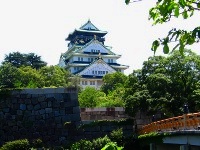Osaka Go Camp 2014
In the heart of historical and modern Japan
Program
Go Camp
Go program is every Mon, Tue, Fri, Sat and Sun and will include:
- Lectures
- Teaching games
- League games
- Game reviews
- Special events
Wed and Thu are tournament days for the pros and thus are free for the participants. These days can be used for
- visiting the Kiin and watching the pros at the tournaments and
- optional sightseeing trips.
| Monday | Tuesday | Wednesday | Thursday | Friday | Saturday | Sunday |
|
Jun 29 Checkin |
||||||
|
Jun 30 League game Reviews Lecture |
Jul 1 League game Reviews Lecture |
Jul 2 Visit Kansai Kiin Top amateurs league |
Jul 3 Sightseeing |
Jul 4 League game Reviews Lecture |
Jul 5 Special tournament |
Jul 6 Kansai students friendship tournament |
|
Jul 7 League game Reviews Lecture |
Jul 8 League game Reviews Lecture |
Jul 9 Hiroshima trip |
Jul 10 Hiroshima trip |
Jul 11 League game Reviews Lecture |
Jul 12 Foreigners vs. Japanese tournament |
Jul 13 Visit Insei school Tournament with Kiin children |
|
Jul 14 League game Reviews Lecture |
Jul 15 League game Reviews Lecture |
Jul 16 Sightseeing |
Jul 17 Sightseeing |
Jul 18 League game Reviews League winner memorial game Sayonara party |
Jul 19 Returning home |
Sightseeing in/around Osaka
| Osaka Castle is one of Japan's most famous castles, and played a major role in the unification of Japan during the sixteenth century. It is deep-rooted in the minds of citizens of Osaka as the symbol of Osaka, as is the "Taiko-han" (founder of Osaka Castle, Hideyoshi Toyotomi) |

|

|
Formerly the imperial capital of Japan, Kyoto is now the capital of Kyoto Prefecture, as well as a major part of the Kyoto-Osaka-Kobe metropolitan area. It is the storehouse of Japan’s traditional culture and the stage on which much of Japanese history was played out. With 17 Unesco World Heritage sites, more than 1600 Buddhist temples and over 400 Shintō shrines, Kyoto is also one of the world’s most culturally rich cities. |
| Nara occupies the northern part of Nara Prefecture, directly bordering Kyoto Prefecture. Eight temples, shrines and ruins, together with Kasugayama Primeval Forest, collectively form the "Historic Monuments of Ancient Nara". |

|
